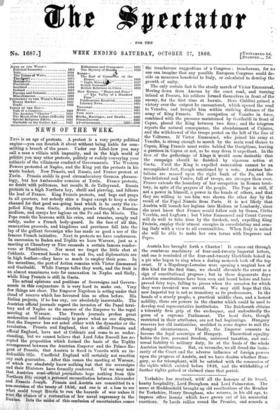Austria has brought forth a Charter! It comes out through
the cumbrous machinery of four-and-twenty Imperial letter's, and one is reminded of the four-and-twenty blackbirds baked in a pie who began to sing when a daring monarch took off the top crust. If a Hapsburg-Lorraine were opening a magical box of this kind for the first time, we should chronicle the event as a sign of constitutional progress ; but in these degenerate days Austrian constitutions have been seen and heard before and have proved fairy toys, falling to pieces when the occasion for which they were invented was served. We may still hope that this new Imperial' toy is not as transitory as its predecessors. In the hands of a sturdy people, a practical middle class, and a honest nobility, there are powers in the charter which could be used to develop real representative institutions. The Reichsrath obtains a tolerably firm grip of the exchequer, and undoubtedly the germ of a supreme Parliament. The local diets, though restricted in their attributes, are not bad beginnings. Hungary recovers her old institutiOns, modified in some degree to suit the changed circumstances. Finally, the Emperor consents to become the legal sovereign of Hungary. Theoretical equality befell, the law, personal freedom, universal taxation, and uni- versal liability to military duty, lie at the basis of the whole Austrian institutions. But, en revanche, we all dread the insin- cerity of the Court and the adverse influence of foreign powers upon the progress of Austria, and we have doubts whether Hun- gary, so far triumphant; will be- satisfied with the concession of the rights which existed before 1848, and the withholding of further rights gained or claimed since that period.


























